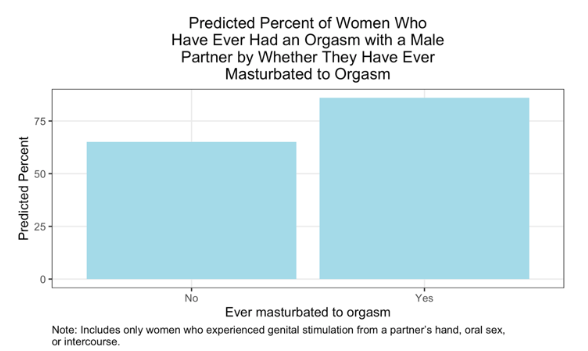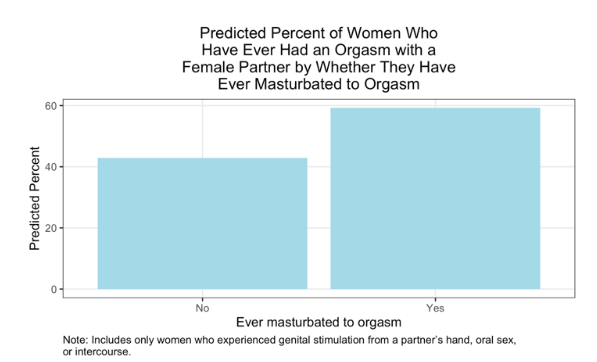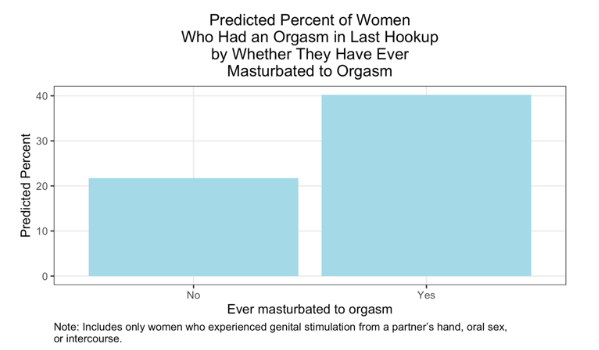Does Masturbation Teach Women to Orgasm in Partnered Sex? (Maybe, but It’s Not Clear)
In 1994, while attending a United Nations conference on AIDS, U.S. Surgeon General Jocelyn Elders was asked her opinion on promoting masturbation to discourage youth from riskier forms of sex. She replied, “It is part of human sexuality, and perhaps it should be taught.” Public controversy erupted, and she resigned at the request of President Bill Clinton. Masturbation, it seems, is something that is widely practiced, but not broadly accepted as respectable to do or talk about. As for how widely practiced it is, the Online College Social Life Survey (OCSLS), collected between 2005 and 2011, found that 62% of women and 91% of men reported they have masturbated. Of women who had masturbated, 70% had done so within the last month.
Our interest in masturbation, like Elders’, arose out of a public health concern. The Surgeon General wondered if greater acceptance of youth masturbation might decrease penetrative sex that carries more risk of contracting HIV. We wondered if more frequent practice of masturbation by girls and women would lessen the well-known orgasm gap between heterosexual men and women. We hypothesized that masturbation could serve as practice, providing women with individualized knowledge of what kinds of stimulation were most pleasurable to them and led them to orgasm. If women passed this knowledge to their partners, and their partners took the suggestions to heart, they might have orgasms more often. The knowledge gained from masturbation could also be used by women to stimulate themselves (e.g. with their hand) during partnered sex. We see experiencing sexual pleasure to be part of health and to potentially contribute to other dimensions of health.
What We Did With the Data
To test whether women’s masturbation histories affect their orgasm in partnered sex, we used the OCSLS data mentioned above—an online survey of over 20,000 US students at 21 colleges and universities. (For more information on the OCSLS, you can read a past blog post here). We selected women respondents and took into account whether women had an orgasm in various contexts as the dependent variables in our models.
One measure of masturbation that we used as an independent variable to predict orgasm was at what age the woman first masturbated. This age could be seen as a measure of how long she has been learning about her own sexual response. Another independent variable was how recently she had masturbated which could be taken as an indicator of frequency of masturbation.
No matter whether we put these masturbation measures in separate models or together, and what controls we added (e.g. for age, race, class background, school, etc.) we found that using these measures, masturbation history has no significant effect on women’s orgasm. It didn’t matter if the model was predicting whether the woman had everhad an orgasm with a man or with a woman, or whether she had had an orgasm on her most recent hookup or date with a man or woman—past masturbation did not predict orgasm. At first glance, these results argue strongly against our hypothesis that masturbation provides practice and information that enhances women’s likelihood of orgasm with a partner.
The survey asked another question about masturbation, however, that proved much more predictive; students were asked if they had ever masturbated to orgasm. This doespredict orgasm in partnered sex in various contexts. Below, we show graphs that compare the regression-adjusted percent of women who had an orgasm between two groups: those who have ever masturbated to orgasm and those who have not. The regression models are linear probability models (i.e. OLS model predicting a dichotomous outcome—orgasm or not). All independent variables were categoric and entered as a series of dichotomous indicators. The models include controls for:
- age at first masturbation (with one category for never masturbated)
- indicators for age at first intercourse (with one category for not yet)
- age
- race
- school attended
- mother’s education
- whether her parents are still together
- immigrant status
- height
- body mass index (BMI)
From the results, we computed the predicted percent of women who had an orgasm with a partner for those who had and had not ever masturbated to orgasm, while setting the distribution of control variables to the whole sample distribution in either case.
What We Found
The graphs below are the same in their variables controlled and their key independent variable of whether the woman has ever masturbated to orgasm. However, they differ in the sample used and on whether the yes/no orgasm variable is a “have you ever” question, or a question about a specific event. The sample for our first graph below is all women who have everhad a male partner with whom they did at least one of the following things: had intercourse, had their genitals stimulated by their partner’s hand, or received oral sex. The dependent variable is whether they have ever had an orgasm with a man. The graph shows that, after regression-adjustment for controls, 86% of women who have ever masturbated to orgasm have had an orgasm with a man, while only 65% of those who have never masturbated to orgasm have had an orgasm with a man. (This difference and all the differences in the graphs below are statistically significant.)
What about a woman having an orgasm with a woman partner? Is this too affected by whether she has had experience masturbating to orgasm? To find out, we did an analogous analysis for just the subpopulation of women who have ever had a woman partner from whom they received hand stimulation of genitals or oral sex. (This group overlaps with the group who have had male partners since some women have had both men and women as partners.) We used the same controls to regression-adjust the percents that we discussed above. The graph below shows that, among women who have had a female partner (as defined above), the percent who have had an orgasm with a woman is much higher among those who have masturbated to orgasm—59% compared to 43%.
Sexual activity can happen in various contexts, and one context of special interest is the hookup, common among college students. Past researchhas shown a much larger orgasm gap between men and women in a hookup than in relational (i.e. girlfriend-boyfriend) sex. Thus, we were especially interested in whether past masturbation to orgasm would increase women’s experience of orgasm in hookups with men. Some of the events students called hookups entail no more than kissing and some nongenital touching, and this is unlikely to be enough to make most people orgasm. Thus, we included in the analysis only women whose most recent hookup with a man entailed at least one of the following: intercourse, receiving oral sex, or receiving hand-genital stimulation from the hookup partner. The graph below shows that the adjusted percentage of women who had an orgasm in their last hookup was a dismal 22% among those who had never masturbated to orgasm, but almost twice as high, 40%, for those who had ever done so.
We don’t show the graphs here, but we get similar results if we consider the effect of ever having masturbated to orgasm on having an orgasm during women’s most recent date with a man, analogously limiting the sample to those whose most recent date entailed intercourse or receiving oral sex or hand-genital stimulation. Only 22% of those who hadn’t ever masturbated to orgasm had an orgasm on this recent date, whereas 45% had an orgasm among those who had ever masturbated to orgasm. Similarly, even in a relationship of at least six months with a man, when women reported on the last sexual event that had entailed intercourse, receiving oral sex, or receiving hand/genital stimulation, having ever masturbated to orgasm was predictive of having an orgasm. In their most recent relational event, women who had masturbated to orgasm had an orgasm 81% of the time, whereas those who had not masturbated to orgasm had an orgasm only 57% of the time.
What Do Our Findings Mean?
How do we interpret the fact that those who have masturbated to orgasm are more likely to orgasm in partnered sex with men or women, regardless of whether the context is casual or a relationship? One interpretation is consistent with our original hypothesis—that masturbation provides practice that gives women information they can share with their partners, and in this way it indirectly facilitates orgasm. The problem with this interpretation is that neither of our other measures of masturbation—from how early an age has the woman masturbated, or how often she masturbates—showed significant effects on orgasm in any context, regardless of what controls we moved in or out of the model. Unless we looked at having masturbated to orgasm, masturbation was not predictive of partnered orgasm. One could try to salvage our “practice hypothesis” by saying that practice only works to facilitate partnered orgasm if you had success at orgasm in masturbation, but one would think that such success would relate to how many years one has been masturbating and how frequently one does so.
The fact that the masturbation had to entail orgasm to predict orgasm in a partnered context suggests another possible interpretation of our findings. Women differ in how easily they experience orgasm for some unspecified mix of social or biological reasons. We don’t have a measure of these characteristics, so we can think of them as “omitted variables.” Having an easier orgasmic response may cause some women to succeed in having orgasms when they masturbate, and also cause them to be more likely to orgasm in partnered sex as well. In this view, the regression-adjusted associations we found in our analysis between masturbation to orgasm and partnered orgasm are spurious. That is, first doesn’t cause the second, but a common factor, ease of experiencing orgasm, causes both of them. If that is the correct interpretation, past masturbation actually has no effect on partnered orgasm, even though they are correlated.
Despite our hypothesis that it would encourage partnered orgasm, based on our analysis, we are not confident that more practice with masturbation would help orgasm with partners, although it is possible. We need more research on links between masturbation, other sexual practices, attitudes (especially those that see women to be less entitled to sexual pleasure than men), and orgasm.
Parents, schools, policymakers, and the public are often focused on the dangers of sex, such as STIs and unintended pregnancies. These dangers are real, but we believe that an appropriate public health approach should also take seriously the goal of women’s sexual pleasure and explore its determinants.
Paula England is Silver Professor of Sociology, Sophie Saydah is an undergraduate major in Sociology, and Andrew Levine is a doctoral student in Sociology. All are at New York University.




Comments 13
emsdmdcscs
December 26, 2019ank you so much for this. I was into this issue and tired to tinker around to check if its possible but co https://tracktrace.one/usps/ uldnt get it done. Now that i have seen the way you did it, thanks guys
with
regards
emdcssdmdcscs
December 26, 2019u so m https://tracktrace.one/usps/ uch for this. I was into this issue and tired to tinker around to check if its possible but couldnt get it done. Now that i have seen the way you did it, thanks guys
with
regards
edwintu18
December 31, 2019Sexy photo galleries, daily updated pics
http://amyporntape.gigixo.com/?melody
free porn tube nicole sheridan porn sign ups amanda story porn videos animated porn river mature celebrity porn freee pictures
Brandon Newman
January 14, 2020Dear author, thank you very much for this helpful information about the my homework help, which will be really helpful for me now!
https://PayForEssay.net
January 14, 2020I think that it is individual. It's just a simple expeerience that you may have.
zoelaw
January 29, 2020This question is very important masturbation replace having sex with a partner for men but in reality it is impossible, We believe in healthy food intake like vegan mango recipes
Digital_Zone
March 9, 2020Excellent article. Very interesting to read. I really love to read such a nice article. Thanks! keep rocking. kiralık sepetli vinç
whatsapp sniffer apk
March 20, 2020I also think it mainly depends on your intercourse partner. Coming to individual level gives us even more great understanding. Bring awareness on masturbation by sharing such kind of articles to all educated people via Whatsappsniffer apk now.
alberttynzov
March 26, 2020You know that there are two varieties of cannabis: marijuana and hemp. Unlike the more well-known tetrahydrocannabinol component of marijuana, it is considered a first-category drug along with heroin and cocaine, and cannabidiol is a non-psychotropic component of cannabis that does not overshadow consciousness. Until today, I did not know that there was any difference between them! But thanks to this blog https://bestcbdvapes.net already found out! CBD interacts with many body systems - from combination with serotonin receptors responsible for “good mood” to stimulating the work of receptors that calm the nervous system. Scientists call this property "full body massage."
kiana
March 29, 2020Dear Paula, much thanks for this supportive data about the my homework help , which will be extremely useful for me now!
granny
September 13, 2020In 1994, while attending a United Nations conference on AIDS, U.S. Surgeon General Jocelyn Elders was asked her opinion on promoting masturbation to discourage youth from riskier forms of sex. She replied, “It is part of human sexuality, and perhaps it should be taught.” Public controversy erupted, and she resigned at the request of President Bill Clinton. Masturbation, it seems, is something that is widely practiced, but not broadly accepted as respectable to do or talk about. As for how widely practiced it is, the Online College Social Life Survey (granny), collected between 2005 and 2011, found that 62% of women and 91% of men reported they have masturbated. Of women who had masturbated, 70% had done so within the last month.
seo audit tool
January 18, 2021Thanks for sharing it, Great Post!!!
word counter
October 25, 2021It's a good idea